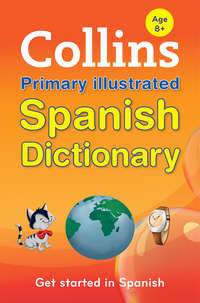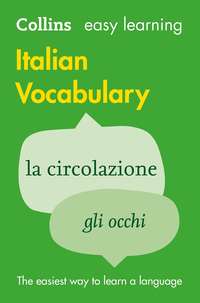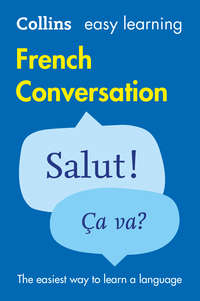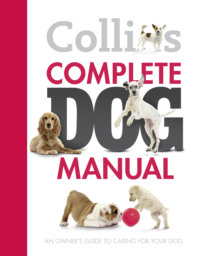
Полная версия
Collins Junior Illustrated Dictionary

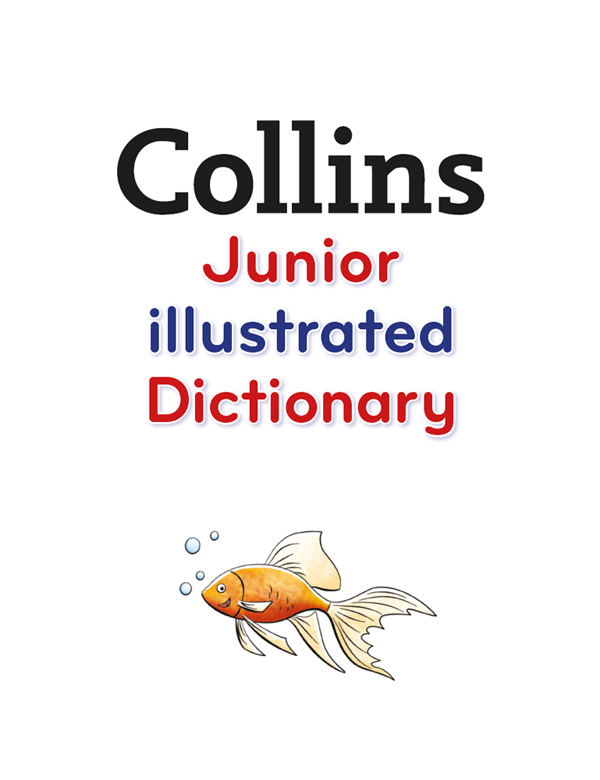
Contents
Cover
Title Page
Using this dictionary
Aa
Bb
Cc
Dd
Ee
Ff
Gg
Hh
Ii
Jj
Kk
Ll
Mm
Nn
Oo
Pp
Rr
Ss
Tt
Uu
Vv
Ww
Xx
Yy
Zz
Collins Word Wizard
The body
Clothes
Family
Feelings
Food and drink
School and study
Weather and seasons
Insects
Amphibians
Reptiles
Young animals
Colours and shapes
Solid shapes (3D)
Words we use a lot
Silent letters
Confusable words
Parts of speech
Punctuation
Prefixes
Suffixes
Synonyms
Antonyms
Where words come from
Top tips for tricky words
Plurals
Measures
Numbers
Fractions
Time
Index
Picture Credits
Copyright
About the Publisher
Using this dictionary
A dictionary tells you what a word means and how to spell it. The words in a dictionary are listed in alphabetical order.
How to find a word
Think of the first letter in the word you want to look up. Once you know this, there is more than one way to find your word in the dictionary:
• You can use the Index at the back of the ebook which lists all of the dictionary words in alphabetical order. Scroll through the Index until you find the letter your word begins with, then look down the words until you find the one you are looking for. You can then follow the link to the entry in the dictionary.
• You can use the Contents page at the front of the book, which has a link to every letter in the dictionary. Follow the link to the letter your word begins with, then look through the entries in this letter until you find the word you are looking for.
Finding out about a word
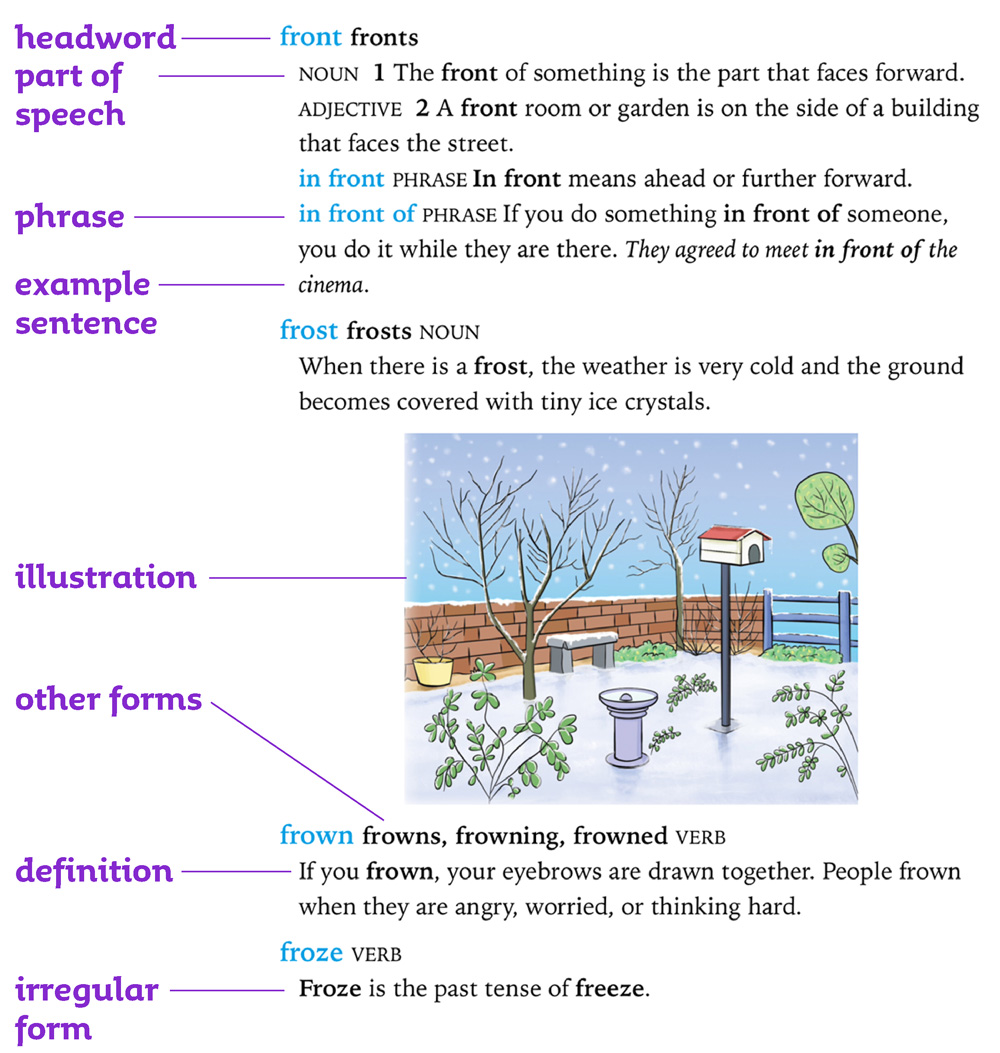
1. The headword is the word you are looking up.
2. On the same line as the headword, you will see how to spell other forms of the word, such as plural nouns, verb tenses or other adjective forms, called comparatives and superlatives.
3. Next you will see the part of speech. This tells you what type of word the headword is, such as a noun, verb, adjective, adverb or pronoun.
4. After the part of speech, you will find the definition. The definition tells you what the word means. The definitions are numbered if there is more than one. Each definition has its own part of speech.
5. Some words have an example sentence in italics. This shows you how the word might be used in speech or writing.
6. Some words have a photo or other illustration to help you read the word and understand its meaning.
7. A phrase may also be included. Under the word front, you will also find the definition of the phrases in front and in front of.
8. An irregular form of a word is a plural noun or verb tense which does not follow the usual spelling rules. You can find many irregular forms in this dictionary.
Other dictionary features
Pronunciation is how you say a word. Some words can be spelled the same, but sound different and mean different things – these words are called homographs. This dictionary gives you pronunciation help for some words, including homographs. For example:
tear tears, tearing, tore, torn
(rhymes with fear) NOUN 1 Tears are the drops of liquid that come out of your eyes when you cry.
(rhymes with fair) VERB 2 If you tear something, such as paper or fabric, you pull it apart.
Some definitions include a label, such as FORMAL, INFORMAL or TRADEMARK. This tells you a little more about the word or how it is used:
Rollerblade Rollerblades
NOUN; TRADEMARK Rollerblades are roller skates which have the wheels set in one straight line on the bottom of the boot.
Related words are given at the end of some entries, with their parts of speech. These tell you other forms of the word, such as the noun or adverb form. For example:
blur blurs
NOUN A blur is a shape that you cannot see clearly. The car went past so fast it was just a blur. blurred ADJECTIVE blurry ADJECTIVE
Some definitions tell you where to look for more information, such as another headword, or the pages at the back of the dictionary.
are VERB
Are is a present tense form of be. They are both in my class.
See be
Collins Word Wizard
Collins Word Wizard gives you extra help with vocabulary, grammar and spelling. It has pages to help you understand parts of speech, punctuation, and prefixes and suffixes, as well as handy hints for learning tricky spellings. Look out for the themed picture pages and games to play with the dictionary.
Online resources
Explore further at www.collins.co.uk/homeworkhelp for games, activities and extra support for parents and children.
Aa
a or an ADJECTIVE
A and an are used when you talk about one of something. A is used when the next sound is a consonant; an is used when the next sound is a vowel (a, e, i, o or u). a car… an apple
abandon abandons, abandoning, abandoned
VERB 1 If you abandon something, you leave it and do not return. The cub had been abandoned by its mother.
VERB 2 If you abandon a piece of work, you stop doing it before it is finished.
abbreviation abbreviations NOUN
An abbreviation is a short form of a word or phrase. The abbreviation for compact disc is CD.
ability abilities NOUN
If you have the ability to do something, you are able to do it.
able abler, ablest ADJECTIVE
If you are able to do something, you can do it.
aboard PREPOSITION
If you are aboard a ship or plane, you are on or in it.
about
ADVERB 1 You say about in front of a number to show it is not exact. I’ll be home at about five o’clock.
PREPOSITION 2 If you talk or write about something, you say things to do with that subject. He is talking about boats.
above PREPOSITION
If something is above something else, it is over it, or higher up.
He held the ball above his head.
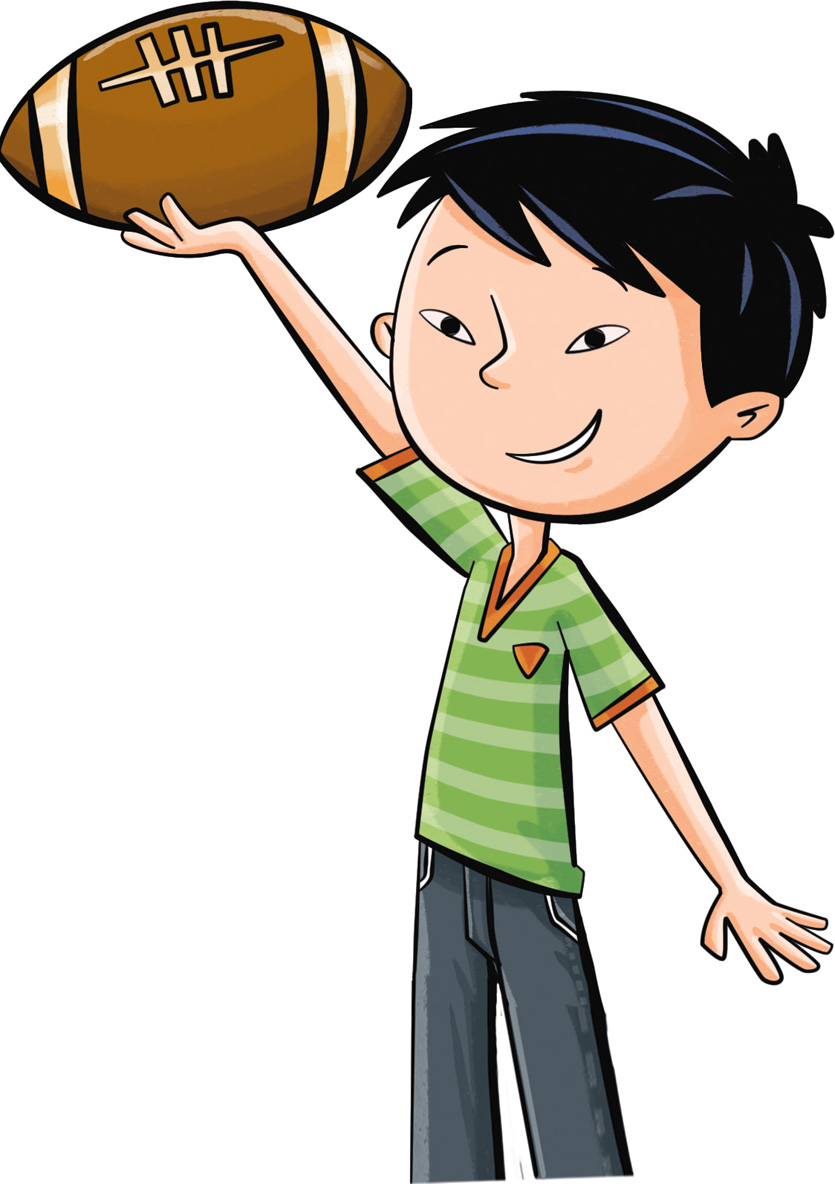
abroad ADVERB
When you go abroad, you go to a different country.
absent ADJECTIVE
If someone is absent, they are not here.
absolutely ADVERB
You can use absolutely to make what you are saying sound stronger. You must stay absolutely still.
absorb absorbs, absorbing, absorbed VERB
If something absorbs a liquid, it soaks it up or takes it in.
absurd ADJECTIVE
Something that is absurd seems silly, because it is quite different from what you would expect. It’s absurd to wear your jumper in this heat.
abuse NOUN
Abuse is cruel treatment of someone.
accelerate accelerates, accelerating, accelerated VERB
When someone accelerates, they speed up.
accept accepts, accepting, accepted VERB
If you accept something you have been offered, you say yes to it.
accident accidents NOUN
An accident is something nasty that happens by chance. He broke his leg in a climbing accident.
accidentally ADVERB
account accounts
NOUN 1 An account is something written or spoken that tells you what has happened.
NOUN 2 An account is also money that you keep at a bank.
accurate ADJECTIVE
An accurate measurement or description is exactly right.
ache aches NOUN
An ache is a dull, lasting pain.
achieve achieves, achieving, achieved VERB
If you achieve something, you usually get it by hard work.
achievement NOUN
acid acids NOUN
Some acids give food a sharp, sour taste. Lemons and vinegar contain acid. Strong acid can burn your skin.
acid rain NOUN
Acid rain is rain that is mixed with dirty gases in the air. It can damage buildings, trees and fish.
acrobat acrobats NOUN
An acrobat is someone who does difficult and exciting tricks, like balancing on a high wire.

across PREPOSITION
If you go across something, you go from one side to the other.
act acts, acting, acted
VERB 1 When you act, you do something. He had to act quickly to put out the fire.
VERB 2 If you act in a play or film, you have a part in it.
NOUN 3 An act is something that you do.
action actions NOUN
An action is a movement of part of your body.
active
ADJECTIVE 1 Someone who is active moves about a lot, or is very busy.
ADJECTIVE 2 In grammar, a verb in the active voice is one where the subject does the action, rather than having it done to them.
See voice
activity activities NOUN
Activity is when there are a lot of things happening.
actor actors NOUN
An actor is a man or woman whose job is to act in plays or films.
actress actresses NOUN
A female actor is sometimes called an actress.
See actor
actual ADJECTIVE
You describe something as actual when you mean it is real. The shop said the paint was red, but the actual colour was pink.
actually ADVERB
adapt adapts, adapting, adapted
VERB 1 If you adapt to something new, you change in some way that helps you.
VERB 2 If you adapt something, you change it to suit your needs. The book was adapted to make a film.
adaptable ADJECTIVE
Someone who is adaptable can change to deal with new situations.
add adds, adding, added
VERB 1 If you add something, you put it with whatever you have already. Put flour in the bowl and add an egg.
VERB 2 If you add numbers of things together, you find out how many you have. The sign + means add. 2 + 3 = 5. I have two marbles in the bag. If I add these three, it makes five altogether.
addition NOUN
Addition is adding numbers or things together.
address addresses NOUN
Your address is the name or number of your house, and the street and town where you live.
adjective adjectives NOUN
An adjective is a word that describes someone or something. “Beautiful” and “green” are adjectives.
See Adjective on page 269
admire admires, admiring, admired
VERB 1 When you admire someone, you think very highly of them.
VERB 2 When you admire something, you enjoy looking at it. They stopped the car to admire the view.
admit admits, admitting, admitted
VERB 1 If you admit something, you agree that it is true.
VERB 2 If people are admitted to a place, they are allowed to go in.
adopt adopts, adopting, adopted VERB
If a person adopts a child, they make the child their own by law.
adore adores, adoring, adored VERB
If you adore someone, you love them very much.
adult adults NOUN
An adult is a grown-up person or animal.

advance advances, advancing, advanced VERB
If someone advances, they move forward. The army advanced nine miles in one day.
advantage advantages NOUN
An advantage is something that helps you do better than other people. His long legs gave him an advantage in the race.
adventure adventures NOUN
If you are having an adventure, you are doing something exciting.
adverb adverbs NOUN
An adverb is a word that answers questions like how, when, where and why. In the sentence “The girl came quietly into the room”, the word “quietly” is an adverb telling you how the girl came in.
See Adverb on page 269
advertise advertises, advertising, advertised VERB
If you advertise something, you tell people about it through newspapers, posters or TV.
advertisement advertisements NOUN
An advertisement is a notice in the paper, or on a poster or TV, about a job or things for sale.
advice NOUN
If you give someone advice, you say what you think they should do.
advise advises, advising, advised VERB
When you advise someone, you tell them what you think they should do.
aerial aerials NOUN
An aerial is a wire that sends or receives radio or television signals.
aeroplane aeroplanes NOUN
An aeroplane is a flying vehicle with wings and one or more engines.

affect affects, affecting, affected VERB
When something affects someone or something else, it changes them in some way.
affection NOUN
Affection is a feeling of caring for someone.
afford affords, affording, afforded VERB
If you can afford something, you have enough money to buy it or do it.
afraid ADJECTIVE
Someone who is afraid thinks that something nasty might happen.
after PREPOSITION
If something happens after something else, it happens at a later time. We’ll watch television after supper.
afternoon afternoons NOUN
The afternoon is the time of day between 12 o’clock (noon) and about six o’clock in the evening.
afterwards ADVERB
If something happens afterwards, it happens after another event or time. We went swimming, and afterwards we had an ice cream.
again ADVERB
If you do something again, you do it once more.
against
PREPOSITION 1 If you play against someone, you are not on their side.
PREPOSITION 2 If you are against something, you are touching it and leaning on it. She felt tired and leaned against the tree.
age ages
NOUN 1 Your age is how old you are.
NOUN 2 An age is a special period in history, like the Stone Age.
ago ADVERB
If something happened four days ago, it is four days since it happened.
agree agrees, agreeing, agreed
VERB 1 If you agree with someone, you think the same about something.
VERB 2 If you agree to do something, you say you will do it.
agreement NOUN
ahead ADVERB
Something or someone who is ahead of you is in front of you.
My brother ran ahead of us.

aim aims, aiming, aimed
VERB 1 If you aim at something, you point a weapon at it.
VERB 2 If you aim to do something, you plan to do it.
air NOUN
Air is the mixture of gases that we breathe.
aircraft NOUN
An aircraft is a vehicle that flies. Helicopters and aeroplanes are aircraft.
airport airports NOUN
An airport is a place where aircraft land and take off.
alarm alarms
NOUN 1 An alarm is something like a bell or flashing light that warns you of something.
NOUN 2 Alarm is a feeling of fear.
He looked at the hungry bear in alarm.
album albums NOUN
An album is a book that you put things like stamps or photographs in.
alien aliens NOUN
In science fiction, an alien is a creature from outer space.
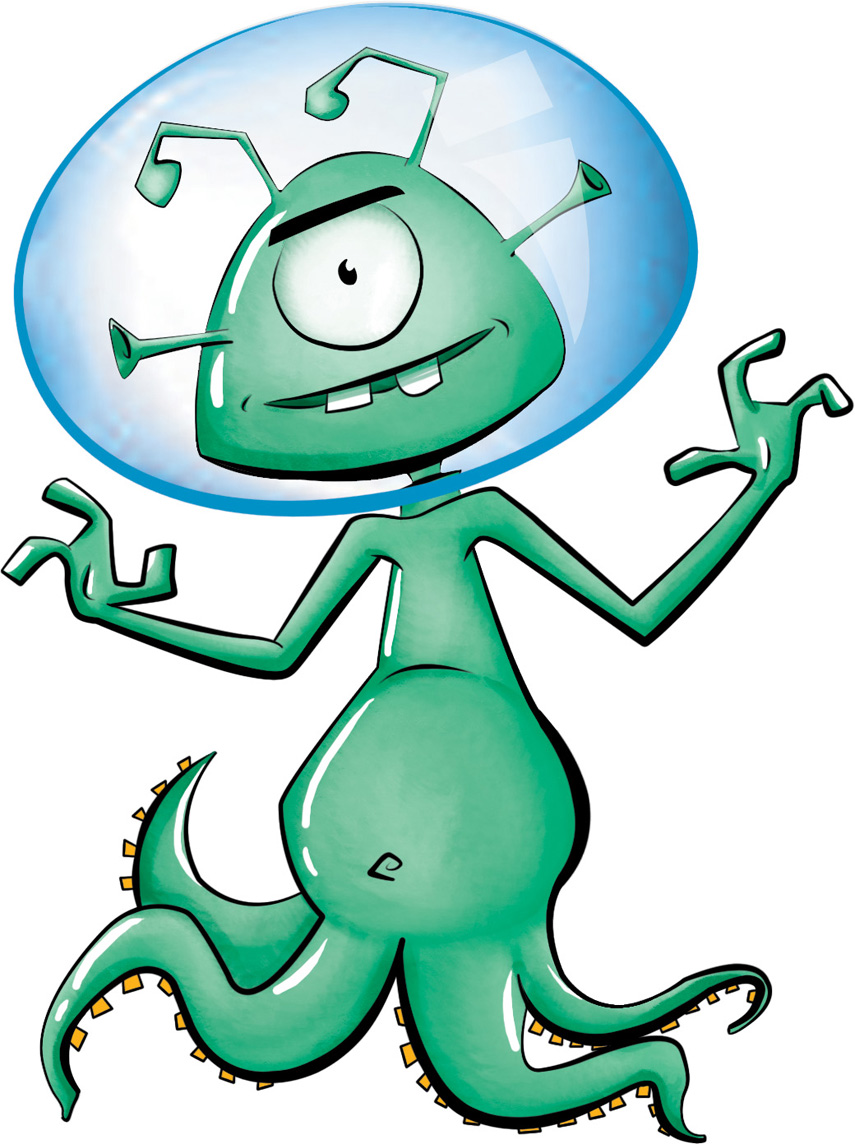
alight ADJECTIVE
If something is alight, it is burning.
alike ADJECTIVE
If two or more things are alike, they are the same in some way.
alive ADJECTIVE
If a person, animal or plant is alive, they are living now.
all ADJECTIVE
You say all when you mean the whole of a particular group or thing. Put all your toys away.
Allah NOUN
Allah is the Muslim name for God.
allergy allergies NOUN
If you have an allergy to something, it makes you ill. Tom has an allergy to nuts, so he must not eat them.
alley alleys NOUN
An alley is a narrow path with buildings or walls on both sides.
alligator alligators NOUN
An alligator is a reptile. It is of the same family as a crocodile, but smaller.
See Reptiles on page 264
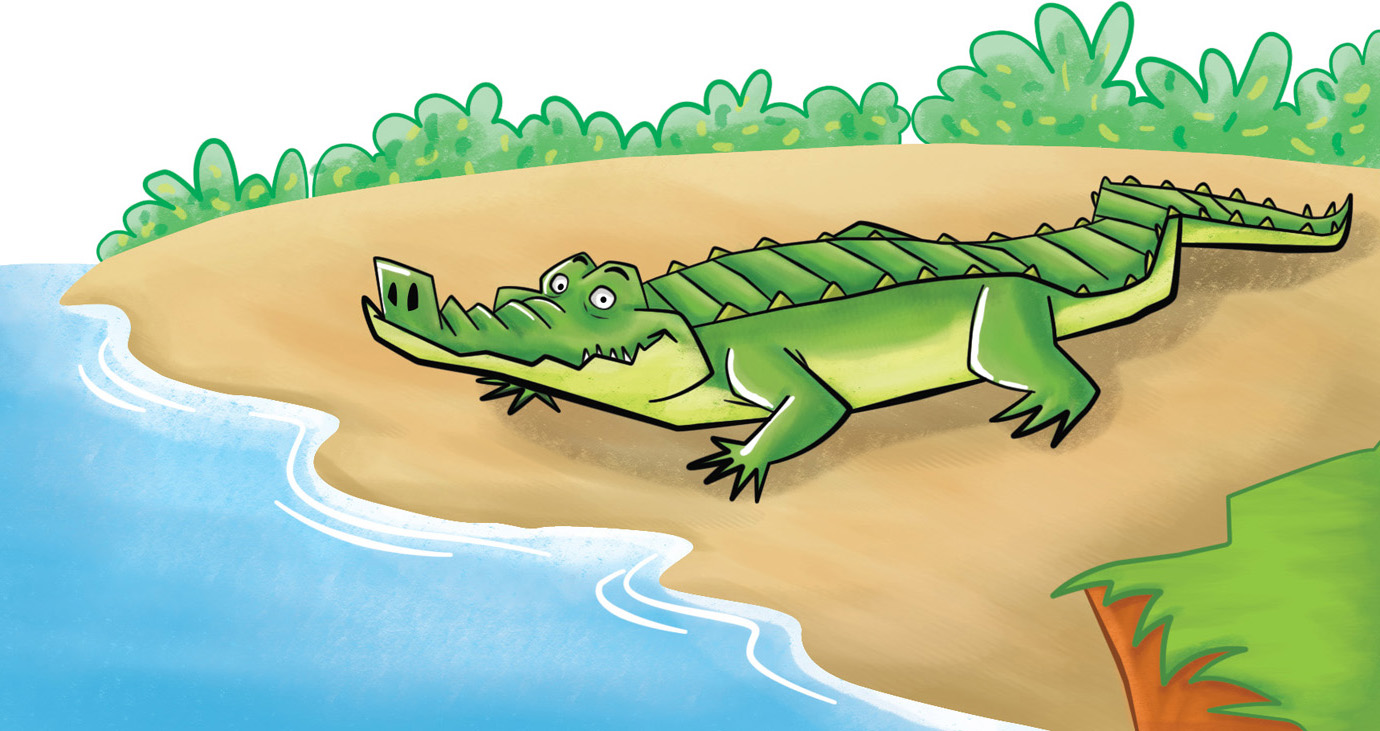
alliteration NOUN
Alliteration is the use of words close together which begin with the same sound, for example “hundreds of huge hairy horses”.
allow allows, allowing, allowed VERB
If someone allows you to do something, they let you do it.
all right
ADJECTIVE 1 If someone is all right, they are well or safe. See if the baby’s all right.
INTERJECTION 2 You say all right if you agree to something.
almost ADVERB
Almost means very nearly, but not quite.
He tripped and almost fell.
alone ADJECTIVE
If you are alone, there is nobody with you.
along PREPOSITION
If you go along something, you move towards the end of it.
aloud ADVERB
If you read something aloud, you read it so that people can hear you.
alphabet alphabets NOUN
An alphabet is all the letters used to write words, written in a special order.
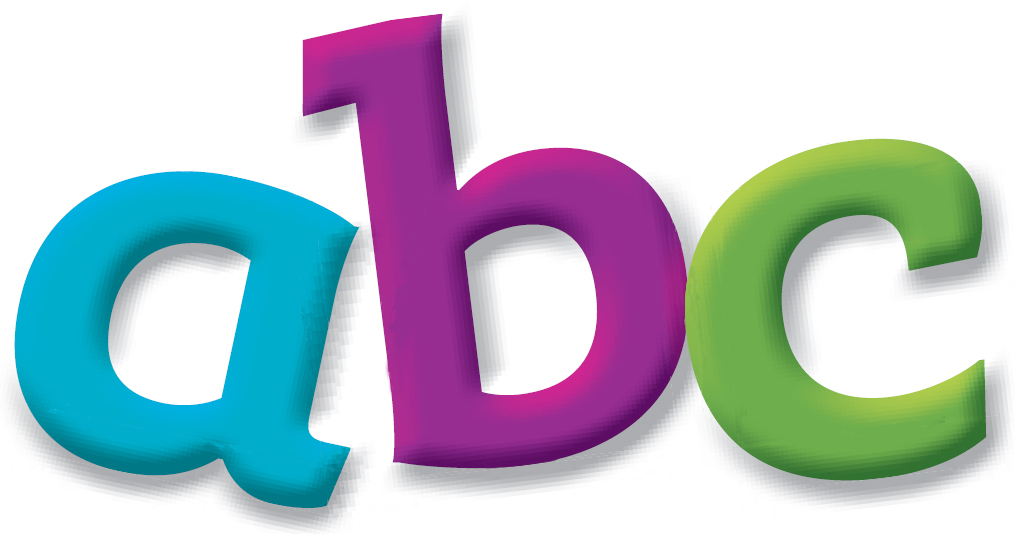
alphabetical ADJECTIVE
Alphabetical means arranged in the order of the letters of the alphabet. She read out the names on the register in alphabetical order.
already ADVERB
If you have done something already, you did it earlier.
also ADVERB
You say also when you want to add to something you have just said.
alter alters, altering, altered VERB
When you alter something, you change it in some way.
alternate alternates, alternating, alternated VERB
When two things alternate, they regularly happen one after the other. He alternates between being friendly and completely ignoring me.
although CONJUNCTION
You say although when you expected something different. Although my dad was cross, he still gave me my pocket money.
altogether ADVERB
If you say there are a number of things altogether, you are counting all of them. I’ve picked four apples and you’ve picked two, so that’s six altogether.
aluminium NOUN
Aluminium is a light, silver-coloured metal. It is used for making rolls of foil and containers like cans and pie dishes.
always
ADVERB 1 If you always do something, you do it every time. He always puts his things away when he has used them.
ADVERB 2 If something has always been so, it has been that way at all times. They have always been good friends.
a.m. ADVERB
a.m. is the time between midnight and noon. I get up at 7 a.m.
See p.m.
am VERB
Am is a present tense form of be used when you are talking about yourself. I am six years old.
See be
amaze amazes, amazing, amazed VERB
If something amazes you, it surprises you very much.
amazement NOUN
amazing ADJECTIVE
Something that is amazing is very surprising or wonderful.
ambition ambitions NOUN
If you have an ambition to do something, you want to do it very much.
ambulance ambulances NOUN
An ambulance is a vehicle that is used to take people to hospital.
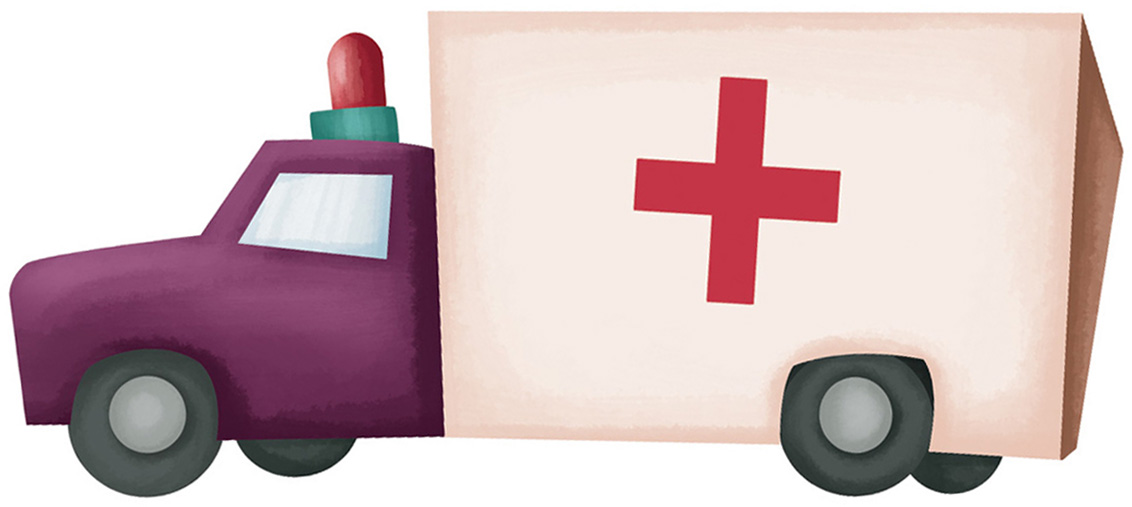
among
PREPOSITION 1 If something is among a number of things, it is surrounded by them. He sat among piles of books.
PREPOSITION 2 If something is divided among several people, they all have a share.
amount amounts NOUN
An amount of something is how much there is of it.
amphibian amphibians NOUN
An amphibian is an animal that is able to live on land and in water.
amphibious ADJECTIVE
See Amphibians on page 264
amuse amuses, amusing, amused VERB
If you amuse somebody, you make them smile or stop them feeling bored.
an ADJECTIVE
An is a form of “a” used when the next sound is a vowel.
See a
analogue ADJECTIVE
An analogue watch or clock shows the time with hands that move round a dial.
See digital
anchor anchors NOUN
An anchor is a heavy metal hook on a long chain. It is dropped over the side of a boat to stop it moving.

ancient ADJECTIVE
If something is ancient, it is very old.
and CONJUNCTION
You use and to join two or more words or phrases together. I like chocolate, and my brother does too.
angel angels NOUN
Angels are beings some people believe act as messengers for God.
anger NOUN
Anger is the strong feeling you have about something that is unfair.
angle angles NOUN
An angle is the shape that is made when two lines or surfaces join. The size of an angle is measured in degrees.
angry angrier, angriest ADJECTIVE
If you feel angry, you are very cross.
angrily ADVERB
animal animals NOUN
Animals are living things which are not plants. Humans, dogs, birds, fish, reptiles and insects are all animals.
ankle ankles NOUN
Your ankle is the joint between your foot and your leg.
anniversary anniversaries NOUN
An anniversary is a day when you remember something special which happened on that date in an earlier year.
announce announces, announcing, announced VERB
If you announce something important, you tell people about it publicly. My sister’s engagement was announced last week.
annoy annoys, annoying, annoyed VERB
If you do something which annoys someone, you make them cross.
annual annuals
ADJECTIVE 1 Something that is annual happens once a year, like a birthday.
NOUN 2 An annual is a book that comes out once a year.


